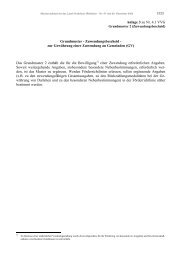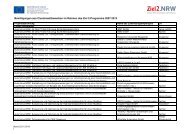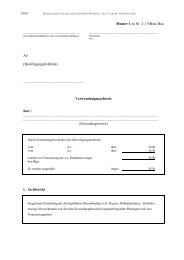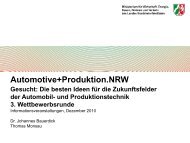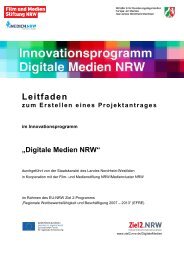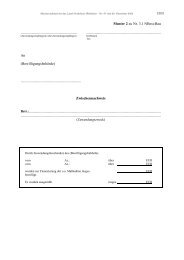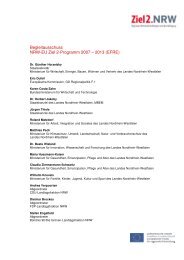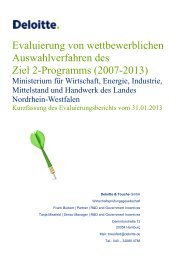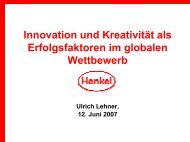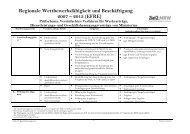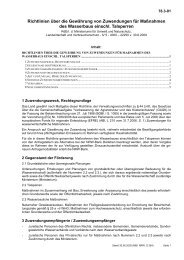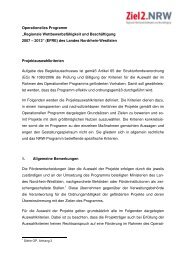Synthesis Report - European Commission - Europa
Synthesis Report - European Commission - Europa
Synthesis Report - European Commission - Europa
You also want an ePaper? Increase the reach of your titles
YUMPU automatically turns print PDFs into web optimized ePapers that Google loves.
<strong>Synthesis</strong> <strong>Report</strong> Ex-post Evaluation of the ERDF 2000-2006<br />
A third aim of the evaluation 34 was to examine whether the management and implementation<br />
system for cohesion policy had the capacity to enable a strategy to be designed and pursued<br />
which was consistent with sustainable development, defined very broadly to encompass the many<br />
and various aspects which this involves. Based on ten case studies and a review of the literature,<br />
the evaluation demonstrated that the system, with programmes based on an analysis of the<br />
economic, social and environmental situation of a region, the setting of appropriate objectives<br />
and the involvement of relevant partners, is suitable for delivering sustainable regional<br />
development.<br />
What emerged from the evaluation was evidence of the building of awareness and the testing of<br />
appropriate measures. The case studies undertaken provided a clear demonstration that the<br />
pursuit of a sustainable development strategy requires political commitment and consensus as<br />
well as the setting of clear and relevant targets. The establishment of suitable administrative<br />
procedures in itself is not enough.<br />
An Integrated Sustainability Triangle for project assessment in Brandenburg, Germany<br />
In Brandenburg, discussion about assessing the sustainability of the ERDF funded projects was<br />
initiated by the <strong>European</strong> <strong>Commission</strong> which requested an assessment of the environmental effects<br />
of funding in the context of a planned programme modification after the mid-term evaluation.<br />
Since there were no adequate sustainable development (SD) indicators in the monitoring system,<br />
the Managing Authority used the opportunity to initiate a broader debate on the sustainability of<br />
the projects funded. Together with the investment bank of the Brandenburg Land (ILB), it developed<br />
a tool for project assessment which not only estimated the environmental effects but also the<br />
economic and social impacts – namely, the 'Integrated Sustainability Triangle' (IST). Based on the<br />
IST, every project is assessed for all three SD dimensions from two perspectives: first, design and<br />
implementation (‘how?’) and, secondly, the results and effects (with what outcome?).<br />
3.7.2 Main issues arising<br />
• In the 2000-2006 programming period, the ERDF supported interventions relevant for<br />
adaptation to climate change, even if on a relatively small scale.<br />
• More guidance and development work are needed to design interventions that are<br />
effective and efficient and monitored and evaluated to a high standard. Support from the<br />
ERDF should only be provided where there is a clear case for public intervention.<br />
• The programme based management system of cohesion policy has the capability of<br />
delivering integrated strategies for sustainable development, but political leadership and<br />
clear and agreed objectives are required for such strategies to be designed and<br />
implemented effectively.<br />
3.8 RURAL DEVELOPMENT<br />
3.8.1 What was the purpose of the evaluation?<br />
It was not a specific objective of the ERDF over the 2000-2006 period to assist the development<br />
of rural areas as distinct from that of non-rural areas. This was left to the EAGGF. Instead, the<br />
ERDF was aimed at assisting the development of all problem regions, whether lagging behind<br />
(supported under Objective 1) or experiencing specific difficulties (supported under Objective 2)<br />
whatever their characteristics. Nevertheless, the growing policy concern with sustainability and<br />
34 Ex post evaluation 2000-06, Work package 11: Management and implementation systems, EPRC.<br />
102



